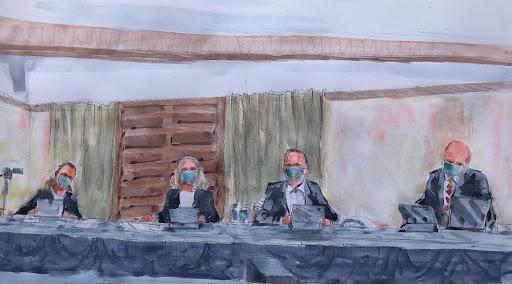Witnesses Insist Massaquoi Was in Liberia in Last Days of War

The four judge panel of Finnish judges in Monrovia Leslie Lumeh/New Narratives.
By Mae Azango, Senior Justice Correspondent, with New Narratives
The Finnish court trying Gibril Massaquoi for war crimes committed in the Liberian civil war has made its unscheduled return to a secret location here to test two critical questions that have arisen in the trial since it left West Africa and returned to Finland in May.
Two prosecution witnesses who appeared today insisted that Massaquoiwho is accused of ordering the murder, torture, and mutilation of civilians and participation in their cannibalization was in the Waterside area of Monrovia in July 2003 during what was known to locals as “World War 3”. The witnesses said they were very clear that Massaquoi was in command of troops defending the embattled government of then-President Charles Taylor against an onslaught by fighters of the LURD rebel group. In August 2003 Taylor resigned and went into exile, ending 14 years of civil conflict.
"I knew Gibril Massaquoi was also known as Angel Gabriel because he was introduced to us by Benjamin Yeatan, known as “Chief 50” because he was next to Taylor,” the second witness told the four-judge panel. The court ordered journalists to keep the witnesses’ identities secret for their protection.
The witness said he had been a boy when he and other boys were captured by one General Shary and taken as child soldiers in 2003 when he controlled the EJ Roye building. The witness said the first time he saw Massaquoi was in 2003 among other generals. "The first time he performed in front of my eyes, was when the civilians went to loot and he got angry and took the gun and shot civilians,” the witness said. “Massaquoi said ‘When you go, tell God, I, Angel Gabriel sent you." Many Liberian witnesses had told the court the same story in hearings held here in March and April.
The problem for the prosecution case is that Massaquoi had been in UN witness protection in Freetown since March when he had entered an agreement with prosecutors in the Special Court for Sierra Leone to inform on Taylor and other fellow combatants. There should have been no way that Massaquoi could have slipped out of witness protection to travel to Monrovia to fight for the president he was informing on at the same time. But earlier witnesses testified that security was lax and there were long gaps in the record of Massaquoi’s detention.
The explosive allegation is at the center of this return visit by the court to Liberia where it had heard from more than 60 witnesses during an earlier hearing in March and April. If found true by the Finnish court, it could cast a cloud over the Special Court which convicted 16 ex-combatants for their role in the Sierra Leone civil war including Taylor who became the first former head of state convicted of war crimes and is serving a 50-year sentence in a UK prison.
Massaquoi has denied all charges. He and members of his family were living in Finland under a special agreement with the UN-backed Special Court for Sierra Leone which gave him immunity from prosecution when he was arrested in March 2020 by Finnish investigators for his role in Liberia. The trial began in Finland in February but moved to Liberia and then Sierra Leone for three months to hear from witnesses and visit the scenes of the alleged crimes in Waterside, Monrovia and Lofa County.
As with earlier witnesses in Liberia, today’s witnesses gave inconsistent testimonies and Massaquoi’s defence lawyer made the most of it. The first witness, Codenamed “X2” was an insider of Charles Taylor's army, and told the court that between June and July 2003 he saw a group of soldiers headed by General "Senegalese" shooting at their fellow soldiers and civilians in a biscuit store at Waterside.
That statement contradicted an earlier statement he made to Finnish police investigators when he said it was Massaquoi who shot the people. X2 told the police that he went along with his boss to escort Massaquoi to Lofa so that he could go back Sierra Leone.
"One Sunday evening in the month of August 2003, both civilians and soldiers were looting the biscuit store around Mechelin Street and the government forces headed by General Senegalese opened suppressive gunfire on soldiers and civilians and locked the store,” X2 told the court. “It was only Senegalese I can remember spearheading the group because it was in the night."
He said World War One and Two (sequence of wars in 2003 in Liberia) occurred in June and lasted for one week each. He said the third phase of the war – World War Three - began early July 2003 and lasted into August.
"I saw Massaquoi the second time in Waterside in July 2003, moving along with some officers and they started shooting at civilians so they could leave the area,” X2 said. “Some civilians died in the process while others got injured. I did not see Massaquoi shooting but he gave the orders. Some soldiers who fled the scene during the shooting ran toward us and said orders were given to shoot.”
Day one also raised the other key issue that brought the hearing back to Liberia to hear from more witnesses. Defence lawyers alleged that documents they presented to the court, showed that Hassan Billity and his staff at the Global Research and Justice Project had coached the witnesses to lie. Witnesses will be probed over this allegation in the coming days.
The trial is to last for two weeks with 21 witnesses testifying.
This story was a collaboration with New Narratives as part of the West Africa Justice Reporting Project.
